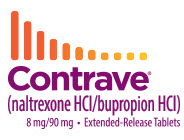 A new pill with the brand name Contrave was recently approved for the treatment of obesity by the FDA. This pill is an extended release, fixed dose, combination of two previously approved medications: bupropion, a commonly used antidepressant which has also been approved as an aid to those were trying to stop smoking, and naltrexone, a medication that blocks the effects of opiates and has been shown to people with severe alcoholism reduce their intake of alcohol.
A new pill with the brand name Contrave was recently approved for the treatment of obesity by the FDA. This pill is an extended release, fixed dose, combination of two previously approved medications: bupropion, a commonly used antidepressant which has also been approved as an aid to those were trying to stop smoking, and naltrexone, a medication that blocks the effects of opiates and has been shown to people with severe alcoholism reduce their intake of alcohol.
It seems like an unlikely combination, but bupropion is not only an antidepressant but it is also one of the very rare medications prescribed by psychiatrists that is associated with slight weight loss, in fact the manufacturer studied it to see if they could get approval of bupropion as a weight loss agent, but the effects were not significant enough to warrant using it in this way.
Bupropion has some stimulant-like effects, although it doesn’t appear to have an abuse potential, but the neurons in the hypothalamus that are activated by bupropion also release endogenous opiates or endorphins which may counteract the appetite suppressing effects of medication. That is the rationale for adding naltrexone, which blocks this effect.
Approval of the combination pill was based on the results from four randomized, double blinded, placebo-controlled, year-long studies in which patients with mild obesity who had one risk factor for poor long-term outcome (hypertension, elevated cholesterol, or type II diabetes) and patients with moderate obesity without risk factors were either given her pill or a placebo. Everyone was also enrolled in a weight loss program emphasizing lifestyle modification (increased exercise and better diet).
In keeping with the discouraging results of lifestyle modification programs alone, those people in the placebo arms of the four studies averaged about a 3% weight loss (6 pounds for a 200 pound individual) over the year. In those who also were taking the active medication weight loss was roughly 7% during that same year.
In keeping with the better results in terms of the primary outcome of weight loss, those receiving the active pill also had lower cholesterol and lower blood sugar.
The most common side effect was nausea (which occurred in about 30% of the patients). We’ve noticed, over the years, that nausea as a side effect of medications has a pretty good correlation with weight loss, so we weren’t surprised by this result. Other common side effects were headache, constipation, dizziness, vomiting, and dry mouth.
More serious but rare potential side effects include seizures (which have been reported with people receiving bupropion, although rarely) and elevated liver function tests (with naltrexone).
The tablets have 8 mg of naltrexone in them and 90 mg of bupropion, it is not known whether taking roughly similar doses of bupropion (which comes as a 100 mg extended release pill) and naltrexone as separate pills would be effective, but the smallest dose of oral naltrexone currently available is a scored 50 mg tablet.

